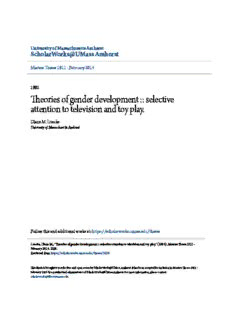Table Of ContentUUnniivveerrssiittyy ooff MMaassssaacchhuusseettttss AAmmhheerrsstt
SScchhoollaarrWWoorrkkss@@UUMMaassss AAmmhheerrsstt
Masters Theses 1911 - February 2014
1992
TThheeoorriieess ooff ggeennddeerr ddeevveellooppmmeenntt :::: sseelleeccttiivvee aatttteennttiioonn ttoo tteelleevviissiioonn
aanndd ttooyy ppllaayy..
Diane M. Luecke
University of Massachusetts Amherst
Follow this and additional works at: https://scholarworks.umass.edu/theses
Luecke, Diane M., "Theories of gender development :: selective attention to television and toy play."
(1992). Masters Theses 1911 - February 2014. 2238.
Retrieved from https://scholarworks.umass.edu/theses/2238
This thesis is brought to you for free and open access by ScholarWorks@UMass Amherst. It has been accepted for
inclusion in Masters Theses 1911 - February 2014 by an authorized administrator of ScholarWorks@UMass
Amherst. For more information, please contact [email protected].
THEORIES OF GENDER DEVELOPMENT:
SELECTIVE ATTENTION TO TELEVISION AND TOY PLAY
A
Thesis Presented
by
DIANE M. LUECKE
Submitted to the Graduate School of the
University of Massachusetts in partial fulfillment
of the requirements for the degree of
MASTER OF SCIENCE
September 1992
Department of Psychology
THEORIES OF GENDER DEVELOPMENT: SELECTIVE ATTENTION
TO TELEVISION AND TOY PLAY
A
Thesis Presented
by
DIANE M. LUECKE
ACKNOWLEDGMENTS
I would like to acknowledge Pat Collins for her countless hours
of guidance and support. Without her I would never have gotten to
My
this point. mother, Dorothy, and father, Robert Luecke, for
believing I could make it. A special thanks to my mom for the
hardships she has endured and the love for living that she has
inspired in me. Without her, I would never have finished this project
in hopes of moving on to grander things in life. I am indebted to
Clara for listening to me when no one else would. Melissa Devlin
deserves my gratitude for helping to collect the data. I am forever
grateful to Jonas for pushing me that last mile. I would also like to
thank Steve and Alison for giving me my sanity through the last three
years. Without them I would have lost sight of what was truly
important in life. Finally, I would like to show my appreciation to
Dan Anderson, Ronnie Janoff-Bulman, and Dick Bogartz for waiting
so patiently.
iii
ABSTRACT
THEORIES OF GENDER DEVELOPMENT-
SELECTIVE ATTENTION TO TELEVISION AND TOY PLAY
SEPTEMBER
1992
DIANE M. LUECKE, B.A, WITTENBERG UNIVERSITY
M.S., UNIVERSITY OF MASSACHUSETTS
Directed by. Professor Daniel R. Anderson
The cognitive-developmental theory of gender development was tested
in two studies. Social-learning, gender schema, and TV theories were
also explored in relation to the results. Subjects were tested for level
of gender attainment using a modified version of the Slaby and Frey
(1975) gender constancy interview. Study One investigated selective
attention of 12, 6 pregender constant and 6 gender constant, five year
old males to television characters and content. The boys were
videotaped for ten days in their homes. The hypothesis that gender
constant boys will look more at male television characters relative to
pregender constant boys was partially confirmed. Study Two examined
a total of 45 minutes of sex-typed toy play and first-toy choice for 153
five year old males and females. Gender constant boys were not more
stereotyped than pregender constant boys in their toy play or choice.
Gender constant girls exhibited mixed results. Gender constant girls
were more sex-typed for first-toy choice and less sex-typed in toy play
iv
constant girls. There was no difference between the pregender and
the gender constant girls in stereotyped toy play for the 5 minute
warm-up session.
V
TABLE OF CONTENTS
Page
ACKNOWLEDGEMENTS
ABSTRACT
LIST OF TABLES
viii
LIST OF FIGURES
ix
Chapter
INTRODUCTION
1. 1
Cognitive-developmental Theory
1
Relevant Research 3
Social-learning and Gender Schema Theories 10
Current Research 14
Study One 15
STUDY ONE
2. 18
Theories of Visual Attention to Television 18
"Reactive" Theory 18
"Active" Theories 19
Research on Children's Attention to Television 20
Gender Development and Television Theories Predictions ... 24
STUDY ONE METHOD 26
3.
Subjects 26
Home Viewing Apparatus and Materials 26
Slaby and Frey (1975) Gender Constancy Interview 27
Coding 30
Pilot Data 39
RESULTS STUDY ONE 41
4.
vi
Gender Constancy
4][
Adult, Human Characters
41
Human
Child, Characters 43
Adolescent, Human Characters 47
Adult, Nonhuman Characters 49
Child, Nonhuman Characters 53
Adolescent, Nonhuman Characters 55
Television Theories 57
Exploratory Analyses 59
Human
Adult, Characters 60
Child, Human Characters 67
Adolescent, Human Characters 67
Adult, Nonhuman Characters 68
Child, Nonhuman Characters 69
Adolescent, Nonhuman Characters 69
DISCUSSION STUDY ONE
5. 73
STUDY TWO
6. 75
Cognitive-developmental Theory 75
Social-learning Theory 76
STUDY TWO METHOD 82
7.
Subjects 82
Toy Play and TV Viewing 82
Gender Constancy Interview 84
Analyses 84
RESULTS STUDY TWO 86
8.
DISCUSSION STUDY TWO 101
9.
GENERAL DISCUSSION 105
10.
APPENDIX: ADDITIONAL TABLES FOR STUDY ONE .... 109
REFERENCES 113
vii
UST OF TABLES
Page
4.1 Analysis of Variance for Attention 61
4.2 Analysis of Variance for Exposure 62
4.3 Means for Attention and Exposure 63
4.4 Number of Dependent Variables 71
8.1 Analysis of Variance for Toy Play 87
8.2 Subjects Missing Data by Dependent Variable 88
8.3 Means and Standard Deviations for Toy Play 91
A.l Difference Scores for Attention in % 109
A.2 Difference Scores for Exposure in % 110
%
A.3 Attention in Ill
%
A.4 Exposure in 112
viii
Description:This thesis is brought to you for free and open access by the Dissertations and Theses at ScholarWorks@UMass Amherst. It has been accepted for inclusion in Masters Theses 1911 - February 2014 by an authorized administrator of ScholarWorks@UMass Amherst. For more information, please.

